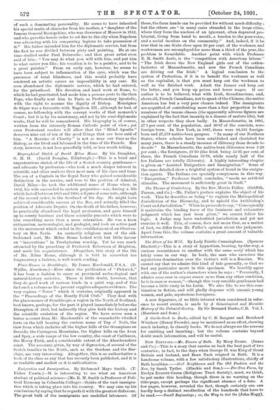Emigration and Immigration. By Richmond Mayo Smith. (T. Fisher Unwin.)—It
is interesting to see what an American student of political science—(Mr. R. M. Smith is Professor of Poli- tical Economy in Columbia College)—thinks of the vast immigra- tion which is taking place into his country. We may sum up his conclusions by saying that he regards it with the greatest disfavour. The great bulk of the immigrants are unskilled labourers. Of these, the farm hands can be provided for without much difficulty ; but the others are " in many cases stranded in the large cities,. where they form the nucleus of an ignorant, often depraved pro- letariat, living from hand to mouth, a burden to the poor-rates,. and a social incubus on the community." And, indeed, if it be true that in one State close upon 30 per cent. of the workmen and workwomen are unemployed for more than a third of the year, the is formidable. Another point with which Professor It. M. Smith deals, is the " competition with American labour." " The Irish drove the New England girls out of the cotton- factories of Massachusetts, and now the French Canadians are driving out the Irish." A logical conclusion to Use system of Protection, if it is to benefit the workman as well as the capitalist, is that you must keep out the workman as well as the finished work. Admit the former and keep out the latter, and you keep up prices and lower wages. If our- author is to be believed, what with Irish, Scandinavians, and,. above all, French Canadians, not to speak of the Chinese, the native American has but a very poor chance indeed: The immigrants are acquitted of contributing more than a fair proportion to the of the insane classes (the apparently adverse figures are explained by the fact that insanity is a disease of mature life), but in other respects they show badly. In Massachusetts, in 1885,. 27.1 per cent. of the population, and 36.87 of the convicts, were- foreign-born. In New York, in 1887, there were 44,455 foreign- born and 27,173 native-born paupers. " In many of our Northern States, where schools have been established and cherished for many years, there is a steady increase of illiteracy from decade to• decade." In Massachusetts, the native-born illiterates were 1.29 per cent. ; the foreigners, 21.50 (the Irish being 54'95 per cent. of these, the French Canadians 39.78, while nearly half of the few Italians are totally illiterate). A highly interesting chapter is given on "Assisted Emigration and Immigration." Some of the cases detailed show a frightful system of fraud in the emigra- tion agents. The Italians are specially conspicuous in this way. " Emigration," Professor Smith concludes, " needs no artificial stimulus. The movement is sufficiently great in itself."


































 Previous page
Previous page